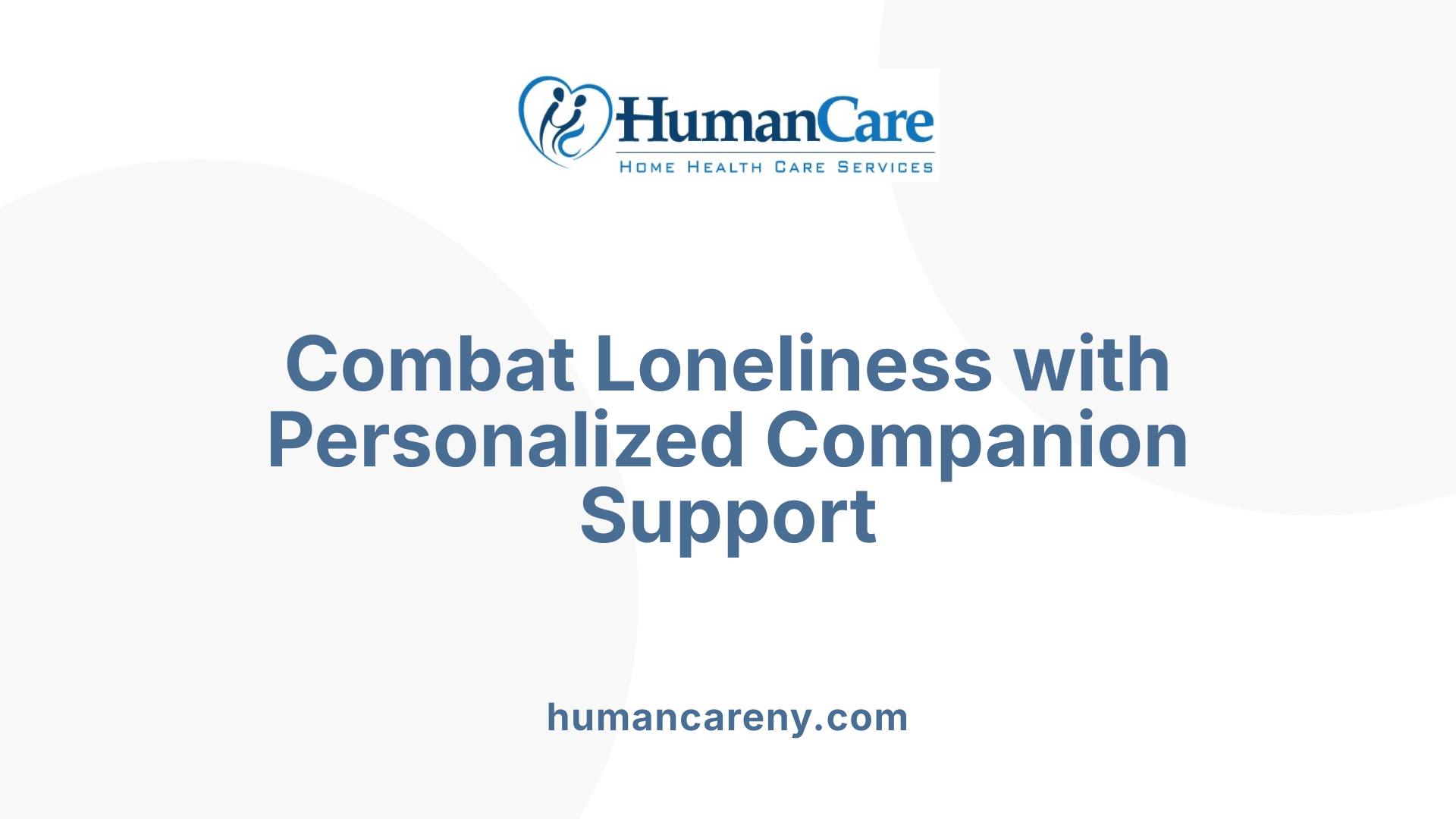The Power of Connection in Senior Care
As people age, maintaining emotional health becomes crucial to ensuring a high quality of life. Companion care plays a vital role in supporting seniors' emotional well-being, helping them combat loneliness, foster social engagement, and sustain mental resilience. By offering non-medical, personalized companionship, care providers create a foundation for emotional stability and overall happiness in seniors living at home or in assisted environments.
How companion care supports seniors' emotional well-being

How does companion care support seniors' emotional well-being?
Companion care plays a vital role in enhancing the emotional health of seniors by offering consistent, nurturing interactions. Regular visits from compassionate caregivers reduce feelings of loneliness and social isolation, which are common issues among older adults. These interactions often include heartfelt conversations, engaging in hobbies, or sharing meals, all of which foster a sense of connection and joy.
Beyond mere companionship, these positive engagements build trust and create an environment of emotional safety. Seniors feel valued and heard, encouraging them to express their feelings openly. This supportive environment promotes emotional resilience, helping seniors cope with the challenges of aging, such as loss of independence or health concerns.
Caregivers are also attentive to subtle signs of emotional distress, like sadness, anxiety, or confusion. Recognizing these signals allows them to address potential issues early, sometimes by connecting seniors to mental health professionals or support groups. Such proactive measures ensure seniors receive the emotional support and healing they need.
Engaging activities facilitated by companions, such as laughter therapy, creative arts, or reminiscence sessions, stimulate positive emotions and promote psychological well-being. These experiences help seniors process past wounds, reduce stress, and foster feelings of happiness and purpose.
In summary, companion care integrates emotional support with everyday activities, creating a supportive space where seniors can thrive emotionally. This holistic approach nurtures not only their physical health but also their mental and emotional resilience, leading to a higher quality of life and a sense of fulfillment during late years.
Activities and methods used in companion care to promote emotional health

What activities and methods are used in companion care to promote emotional health?
In companion care, a wide array of activities and strategies are employed to support seniors’ emotional well-being. These include engaging seniors in meaningful conversations and social activities that foster connection and joy. Caregivers often participate in recreational hobbies like arts, music, puzzles, and crafts, which stimulate the mind and evoke positive feelings.
A crucial approach is reminiscence therapy, where seniors are encouraged to share life stories and reflect on positive memories. This technique helps validate feelings, foster emotional validation, and reinforce a sense of identity and purpose.
Participation in community events and social outings is strongly encouraged to combat loneliness. Caregivers assist with transportation and facilitate involvement in local clubs, religious services, or group activities. The use of digital technology, such as video calls and social media, further helps seniors maintain connections with loved ones, especially when mobility is limited.
Activities that stimulate cognitive functions—like playing games, engaging in creative arts, or listening to music—are vital for emotional resilience. These activities not only provide mental stimulation but also encourage seniors to feel capable and independent.
Building trusting relationships with caregivers is fundamental. Through consistent, empathetic support, seniors learn to express themselves openly, which enhances their emotional security. Caregivers also address mental health concerns by incorporating techniques tailored to each senior’s preferences and needs.
Overall, these diverse methods help seniors live more emotionally balanced lives, reducing feelings of isolation and depression while promoting happiness, purpose, and connection in everyday life.
Alleviating loneliness and social isolation through companion care

How does companion care alleviate loneliness and social isolation among seniors?
Companion care plays a vital role in reducing feelings of loneliness and social isolation among older adults by ensuring they receive regular, meaningful social interactions. Caregivers engage seniors in conversations, share hobbies, and participate in activities that foster a sense of companionship and belonging.
One of the primary ways companion care helps is by encouraging participation in social and community events. This can include outings to local parks, attending clubs, or going to religious services, which enhances social ties and mental stimulation.
Technology assistance is another important aspect. Caregivers often teach seniors how to use video calls, social media, or messaging apps. This skill allows seniors to stay connected with loved ones, particularly those who live far away, providing ongoing emotional support and companionship.
Additionally, caregivers motivate seniors to engage in hobbies, such as arts and crafts, music, or light exercises, combined with outings like walks or visits to galleries and theaters. These activities support physical health, stimulate the mind, and promote emotional well-being.
By establishing personal relationships, companion care helps seniors feel appreciated, understood, and valued. These consistent interactions help prevent feelings of abandonment or insignificance, significantly decreasing the risk of depression and mental decline.
Summary:
| Aspect | How It Helps | Additional Details |
|---|---|---|
| Social Interaction | Reduces loneliness; builds relationships | Conversation, shared activities, emotional support |
| Community Engagement | Fosters social inclusion | Attending local events, social outings |
| Technology Assistance | Maintains long-distance connections | Teaching video calls and social media |
| Hobby and Outing Encouragement | Promotes mental and physical health | Arts, crafts, walks, visits to cultural sites |
Overall, personalized and regular companionship nurtures a sense of purpose and belonging, which is essential for seniors’ emotional and physical health. Through these efforts, companion care effectively helps seniors maintain their independence, happiness, and quality of life while living at home.
The significance of emotional support in senior mental health

What is the role of companion care in supporting mental health for seniors?
Companion care plays a crucial part in maintaining the mental health of older adults by offering consistent emotional support and fostering social connections. Regular visits from caregivers provide seniors with an opportunity for meaningful conversations, engagement in shared activities, and reassurance, which helps combat loneliness and feelings of social isolation.
Through personalized interactions like talking, playing games, or participating in hobbies, caregivers help promote emotional stability and happiness. This engagement not only alleviates symptoms of depression and anxiety but also encourages seniors to stay mentally active.
Social interaction is vital for cognitive health. Engaging in activities such as arts, music, or community outings supports mental stimulation that can help delay cognitive decline and reduce the risk of dementia. Caregivers often motivate seniors to join community events or pursue hobbies, which fosters a sense of purpose and belonging.
Overall, companion care significantly boosts resilience among seniors by meeting their emotional and social needs. It empowers them to maintain independence while feeling valued and heard, ultimately enhancing their quality of life and mental well-being.
Emotional support: importance and implementation in senior care

Why is emotional support important in caring for seniors, and how is it provided?
Emotional support plays a vital role in the well-being of seniors, helping to lessen feelings of loneliness, isolation, and emotional distress. As they age, many seniors face challenges like losing loved ones, health issues, or cognitive changes, which can lead to sadness or depression. Providing emotional support helps seniors feel valued, understood, and connected, significantly improving their quality of life.
Caregivers and family members offer emotional support through active listening and meaningful conversations. Engaging seniors in activities like hobbies, walks, or shared meals fosters a sense of companionship and belonging. Building trusting relationships is essential, as it creates a safe environment where seniors feel comfortable expressing themselves.
Promoting dignity is also crucial in senior care. Caregivers aim to treat everyone with respect, encouraging independence and honoring individual preferences. In cases involving behavioral changes, such as in dementia, understanding and patience are key to managing these behaviors while maintaining the person’s dignity.
Overall, consistent empathy, companionship, and respect help seniors manage emotional challenges, contributing to better mental health, physical health, and a more joyful, meaningful aging experience.
Supporting Seniors' Emotional Well-Being: A Shared Responsibility
In summary, companion care is fundamental in nurturing the emotional health of seniors. It offers more than social interaction; it builds trust, provides comfort, and reinforces a sense of purpose and belonging. As the aging population grows, investing in compassionate, personalized companion services can significantly improve seniors’ mental health, reduce feelings of loneliness, and support their independence. Families, caregivers, and community entities must collaborate to ensure that every senior experiences dignity, respect, and emotional resilience—making senior care a holistic, uplifting journey.
References
- The Emotional Benefits of Companion Care for Seniors
- How Companion Care Can Help Combat Senior Isolation and ...
- What are the Psychological Benefits of Companion Care Services?
- The Benefits of Companion Care for the Elderly - Right at Home
- How Companion Care Improves Emotional Well-Being in Seniors
- How Companion Care Helps Seniors Combat Loneliness
- Companion Care: Benefits for My Aging Senior - Rosarium Health
- Companion Care Services & Their Benefits for the Elderly



